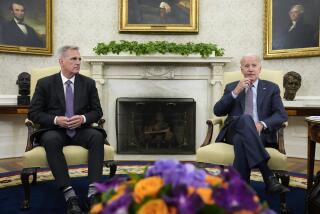But Speaker Is Silent on Whether He’ll Meet Sandinistas Again : Wright, Shultz Make Up After Nicaragua Tiff
- Share via
WASHINGTON — House Speaker Jim Wright (D-Tex.) and Secretary of State George P. Shultz signed an agreement Tuesday to put behind them their disagreements over Wright’s meetings last week with Nicaraguan leaders.
“The Speaker and I--as is well known--had a little tiff, as sometimes happens in democracies like ours. . . ,” Shultz told reporters. “Both of us felt that the important thing now is to look ahead and focus on the things we agree on.”
Seeming to mirror the formality of the diplomatic process in Central America, Wright and Shultz signed their own six-point peace plan aimed at restoring tranquility between the Democratic Speaker and the Republican Administration. One of the points in the pact states: “Neither one of us want to create unnecessary problems. We want to work together to bring about solutions.”
Meaning Unclear
However, it was unclear whether the two sides agreed on the meaning of their agreement.
A State Department spokesman called the agreement “basically a restoration of the status quo, with the secretary in charge of foreign policy and bipartisan support for that policy.”
The spokesman noted that one point of the agreement stipulates that Central American peace negotiations should be conducted mainly among Central Americans, something the White House underlined in criticizing Wright’s meetings with Nicaraguan President Daniel Ortega last week.
But when Wright was asked whether he had agreed not to meet again with Nicaraguan leaders, he only grinned. A source close to Wright said that he had not made any such deal and added that the Speaker still plans to travel to Costa Rica on Dec. 1, as he had previously announced.
Arranged by Strauss
Wright and Shultz said their unusual agreement was mediated by Democratic political strategist Robert S. Strauss, who had been invited to lunch by the secretary of state to discuss the dispute. He later arranged for Shultz to visit Capitol Hill.
Even before the agreement was announced, White House spokesman Marlin Fitzwater took pains to play down any animosity between the Administration and the Speaker.
“The war’s over. The war’s over,” he told reporters at midday, turning aside repeated efforts to prod him into discussing the controversy.
Reagan and Shultz confronted Wright at a White House meeting Monday, complaining that the Speaker should not be injecting himself into the peace process.
In particular, they objected to Wright’s meeting last Thursday and Friday with Ortega and Nicaraguan Cardinal Miguel Obando y Bravo, who is expected to serve as mediator between the leftist Sandinista government and the U.S-backed Contras.
The Speaker argued that Central American leaders such as Ortega come to him because they believe that State Department officials do not want a settlement. Wright also had been angered by an article Sunday in the Washington Post in which an unnamed Administration official bluntly criticized his actions. Wright said he believes the official was Assistant Secretary of State Elliott Abrams.
Strategic Trap
In a related matter, a State Department official Tuesday described Nicaragua’s recent offer of a cease-fire in its war with the Contras as a strategic trap aimed at luring the rebels into areas where they can be surrounded.
Ortega has proposed halting the war by establishing three large cease-fire zones in which the rebels would be allowed to gather unmolested before laying down their arms. Contra political leaders already have rejected the plan as an invitation to surrender.
The U.S. official said that Contra forces have stepped up the war this fall “in spite of all the politics that are going on” and indicated that air-drops of rebel supplies inside Nicaragua doubled in October, to about 250,000 pounds. Careful stockpiling of the air-dropped supplies should enable the Contras to fight into next year, the official said.
Upbeat Assessment
In an upbeat assessment of the rebels’ military status, the official also said that Contra forces have captured enough weapons and recruited enough volunteers to wage war against the Sandinistas for some time to come. Keeping the army fed and clothed is now the major logistical problem, he added.
The Contra strategy, the official said, is to “fight-talk” until the Ortega government agrees to a political settlement of the conflict.
“They’re getting their clocks cleaned out there,” the official said of the Sandinista army, “and every day they delay a serious (cease-fire) proposal, the resistance gets stronger and moves westward” toward the capital city of Managua.
More to Read
Sign up for Essential California
The most important California stories and recommendations in your inbox every morning.
You may occasionally receive promotional content from the Los Angeles Times.













